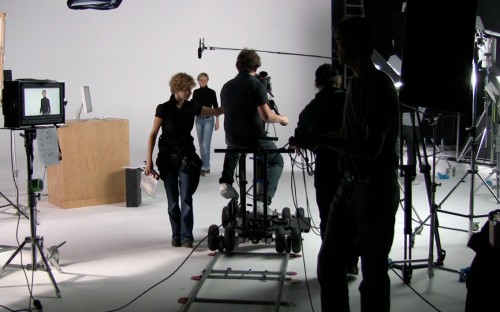With Hollywood productions frequently costing over $200m to make, and earning over $1b worldwide, there’s plenty of fortune to be found in this industry. There’s also an avenue to spread a social message or sell a brand with the vast viewing numbers across digital platforms.
But how do you achieve success in such a fickle area—in an industry where you can follow all the rules and research, but still end up with a flop?
BusinessBecause caught up with three MBA grads in the industry to find out how they’re carving out careers in TV and film.
Ryan Heller, NYU Stern
Ryan graduated in 2011 from a dual MBA/MFA degree offered by NYU Stern and NYU Tisch School of the Arts—currently celebrating its 10th anniversary. Ryan was part of the first class to take the degree, which aims to combine creativity and business.
He’s utilizing this mix of skills in his current role at First Look Media. Launched by eBay founder Pierre Omidyar, First Look Media has its roots in journalism, but has grown to include an entertainment division. Ryan’s responsible for content acquisition in film, television and digital media.
“We make content that connects with sizable audiences, but everything we do comes from creators who have a unique thing to say about the world. The first feature film we were involved with was Spotlight, which is a great example of this,” says Ryan.
“My role can involve sitting down with creatives so having an MFA gives me credibility. I speak a similar language and it shows that I’m passionate about filmmaking.”
For Ryan, this blend of creativity and business has never been more relevant in an industry that’s facing increased disruption from technology.
“The industry is evolving and the way that audiences find content is changing. There’s a lot of opportunity for innovation. Our company has a feel of both an entertainment company and a tech company, which is really important.
“There’s lots of tech coming into entertainment. Companies are innovating in business models, content, and ways of building stories. We’re all waiting for what the defining format will be for the virtual reality (VR) space. Being able to see things from the creative and business side helps you stay ahead.”
Gavin Lurie, UCLA Anderson
Gavin graduated from the UCLA Anderson School of Management MBA in 2015 after completing the entertainment career path specialization. Since then, he’s gone on to found his own creative studio, Endless Media, specializing in VR.
In early 2016, Gavin saw that investment and resources were pouring into hardware, software, and distribution platforms for VR with no concentration on story-driven content. He and his partner built their business to develop projects in VR/AR space. They sold some to Oculus Studios, including the first VR scripted narrative pilot, and they were off and running.
“There’s an increasingly blurred line between what constitutes content,” he says. “The differences between digital, TV, and film have softened. It’s arguably easier to sell projects since the number of buyers has dramatically increased, but at the same time, creating a breakout hit is becoming tougher in a crowded market.”
For Gavin, the MBA has been a ticket to success: “besides the technical skills, I’ve come to realize that an MBA really teaches one holistic skill—problem solving,” he says.
“For me, this entails overcoming hurdles to shepherd a project through development, production, and release, including figuring out creative direction, cast, budget, deal-making, physical production, editing and so on.
“Each project is unique in its process and pitfalls, which makes the MBA even more valuable.
Ravinol Chambers, Aston Business School
Ravinol completed his MBA at the UK’s Aston Business School in 2007. Since the,n he’s gone on to found Be Inspired Films, a multi award-winning video production company helping individuals and organizations have a social impact by bringing their stories to life.
With a passion for philanthropy, Ravinol’s motto since graduating has been profit with purpose. He’s now using the power of storytelling to drive social change. With the arrival of YouTube and easier access to film making, he saw an opportunity when he graduated.
“There wasn’t anybody bringing film and social impact together. I want to see change happening and I think story telling is massively powerful in helping it to,” he says.
After building up an impressive client list and winning awards for his work, Ravinol sees feature length documentaries around social issues as the future of the company. With footage collected for his first documentary, he’s expecting to release the project next year.
“The biggest thing the MBA gave me was confidence,” he says. “Confidence to operate in an area I wouldn’t have been competent in before.”
RECAPTHA :
b0
7f
68
a7










